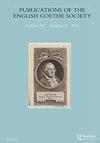Konsumrevolution und Verzeitlichung um 1800: Ein kommodes Feuerwerk bei Claudius und der neue Luxus der Flüchtigkeit in Goethes Wahlverwandtschaften
IF 0.1
3区 文学
0 LITERATURE, GERMAN, DUTCH, SCANDINAVIAN
引用次数: 0
Abstract
ABSTRACT This essay examines firework scenes in Matthias Claudius and Goethe, reading them in the context of a historical shift in the function of popular spectacles: from the representative role of fireworks in the ancien régime, to their broad availability as commodities in modernity. Claudius portrays that cultural change vividly and as the miniaturization of luxury. In Die Wahlverwandtschaften, meanwhile, the newly domesticated art of firework displays illuminates the link between the fashionable ‘little luxury’ and modern ephemerality. Thus, the following argues that literary representations of luxury around 1800, and of fireworks in particular, are examples of an ephemeral and increasing consumer culture at the time, and reflect contemporary accelerated temporalization. Moreover, the discussion of Goethe allows us to draw a line from Die Wahlverwandtschaften to his concept of the Veloziferisches, as well as making reference to other major works (‘An Schwager Kronos’; Faust).1800年前后的消费者革命和时间化:克劳迪斯的商品烟花表演和歌德选择的亲密关系中的快速奢华
本文考察了马蒂亚斯·克劳迪斯和歌德的烟花场景,在流行景观功能的历史转变背景下阅读它们:从古代烟花的代表作用,到它们在现代作为商品的广泛可用性。克劳迪斯生动地描绘了这种文化变化,并将其描述为奢侈品的小型化。与此同时,在Die Wahlverwandtschaften,新近被驯化的烟花表演艺术阐明了时尚的“小奢侈品”与现代短暂性之间的联系。因此,下面的论点认为,1800年左右的奢侈品文学表现,特别是烟花,是当时短暂而不断增长的消费文化的例子,反映了当代加速的时间化。此外,对歌德的讨论使我们能够从《Wahlverwandtschaften》与他的《Veloziferisches》概念联系起来,并参考其他主要作品(《An Schwager Kronos》;《浮士德》)。
本文章由计算机程序翻译,如有差异,请以英文原文为准。
求助全文
约1分钟内获得全文
求助全文
来源期刊

Publications of the English Goethe Society
LITERATURE, GERMAN, DUTCH, SCANDINAVIAN-
CiteScore
0.10
自引率
0.00%
发文量
15
 求助内容:
求助内容: 应助结果提醒方式:
应助结果提醒方式:


